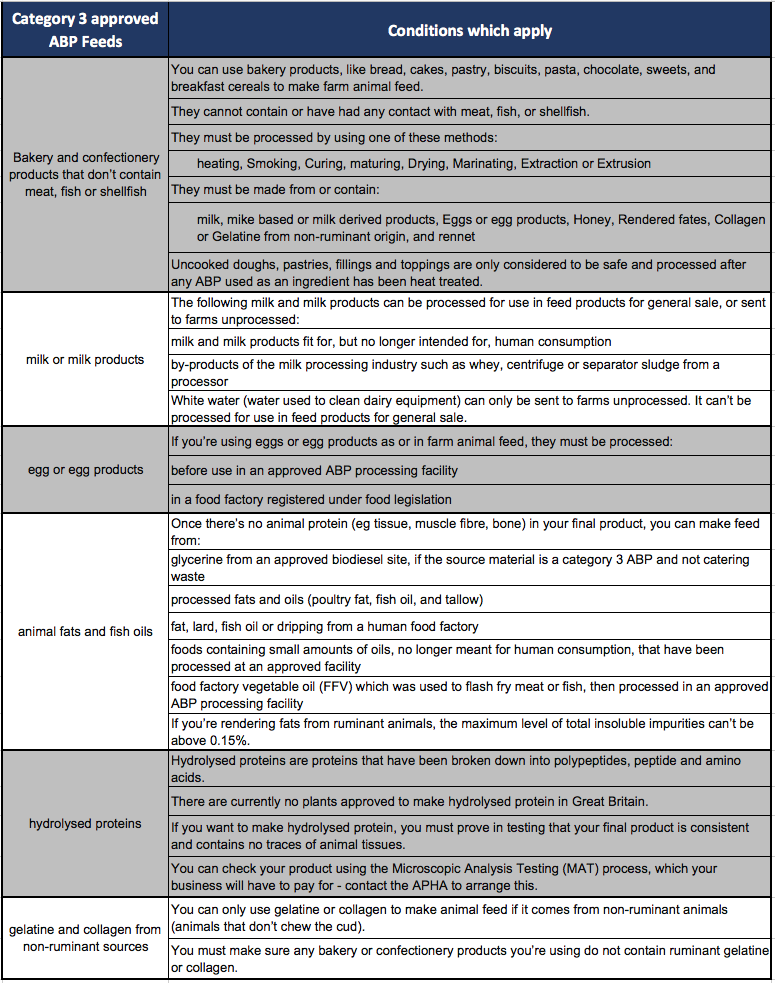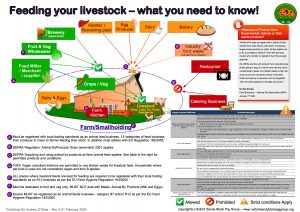Quite frequently, I see on social media people asking questions like “Can I feed my veg peelings to my pigs?”, “I have this out of date cabbage in my fridge, can I give it to my sheep?” or “is it ok to feed this leftover supper to my livestock?”. It’s not uncommon for people to respond with “Sure, we do, never had a problem” or “If you’re not a farmer it fine”. The answer should always be “NO”. Whether you are a smallholder, hobby farmer, back garden livestock keeper, “micro”/pet pig keeper or commercial farmer the UK laws on livestock feed apply – there are no exceptions.
My grandad told me once, “We used to have swill bins at the end of the street where we could dispose of all our feed waste. This was regularly collected by farmers to feed to their animals – mainly pigs.” He wasn’t wrong – he rarely was. It used to be a very common practice, as was feeding your kitchen scraps and feed waste to your livestock, but for the following (but not solely) reason. Many will recall the Foot and Mouth outbreak in early 2001, which lead to the slaughter of over 6 million animals from over 2,000 UK infected farms and livestock places. A review by the Department for Environment, Food and Rural Affairs (DEFRA) stated the outbreak was caused by the following;
Why
“the origin for that outbreak and the index case for the whole epidemic is considered to have been a pig finishing unit at Burnside Farm, Heddon on the Wall, Northumberland (outbreak FMD/04), which was licensed to feed processed waste food under the Animal By-products Order 1999”[1]
The finding, following the 2001 epidemic lead to the government reviewing the Animal By-products Order 1999 and making significant changes to the order and produced the Animal By-products Order (amended) 2001. Although the changes are not limited to, a large portion of the amendments are in the feed regulations – which are in place today and continue to be tightened.
What is the UK law on feed for livestock? The legal definitions of Livestock – which is set out in “Animal ByProducts Order (amended) 2001”
(i)the following definitions shall be inserted in the appropriate place—
“livestock” means—
(a)any creature, including fish, kept for the production of food, wool, skin or fur, and any creature, other than a dog, kept for use in the farming of land; and
(b)any ruminant animal, pig, poultry or equine animal;”
So, what can’t be fed to livestock? It’s probably more efficient to ask “What can be fed to livestock?” In short ,if you stick with the below you won’t breach the UK laws;
- Hay & Straw
- Livestock feed sourced from a registered and approved facility
- Fruit and vegetables that have come straight from the land to your livestock and not via a kitchen, produce packing centre or similar type facility.
There are food wastes that can be fed, ill cover these shortly.
Hay & Straw
If you make your own or buy from your local farmer this can be freely fed to your livestock without any issues
Livestock Feed
Livestock feed typically means the pellets, mash, nuts, rolls or straights (cereals) etc. you buy from your feed merchant. Any merchant selling feed needs to be registered with its local trading standards as an “Animal feeds Business” and comply with the Feed hygiene regulations set out in EU Regulation 183/2005. You can mix your own feeds from cereals with supplements etc but the same laws apply
Fruit & Veg
If you collect the windfall apples from your trees, or pick your excess garden veg and feed straight to the livestock you’re fine. But if you take your garden produce to your kitchen to prepare for eating and then take the peelings and chopping’s to your livestock you’re breaching the UK Laws.
Waste Products
There are waste products from the food and drink industry that can be fed to livestock but the supplier of the product MUST be registered with their local trading standards as a category R7 or R12 business as outlined in the EU Regulation 183/2005. The items include
Bakeries
Vegetable processors
Diary and Egg processing plants
Breweries
In conjunction with the above, the products must meet the following ABP remits
At the end of the day if you are unsure if a food is suitable do NOT feed it to your life stock, if you require guidance and help please reach out to your local Animal Health, Food Standards Agency or Trading Standards, you can normally find their contact details via your council’s website.
I have drawn up a guidance poster which summaries this information, if you would like a copy please click on the link below
What to feed Your Livestock Poster – To purchase click here
REFERENCES
[1]Origin of the UK Foot and Mouth Disease epidemic in 2001
Department for Environment, Food and Rural Affairs. June 2002
Updated February 2020:
I will be reviewing and amending regularly to ensure its current and correct. If you feel some information is inaccurate or would like information adding / clarifying please email andrew@oxfordsandyblackpiggroup.org
———

